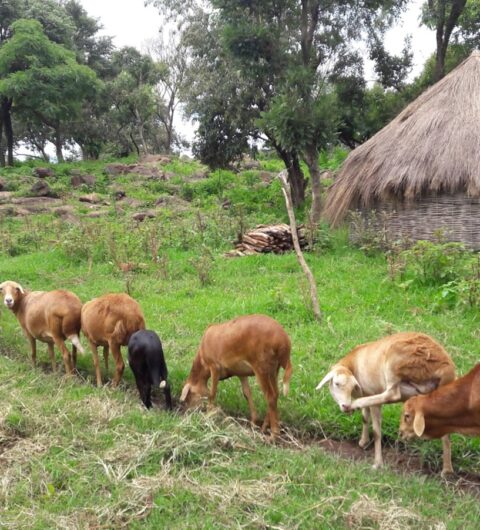Rainfall may have a significant influence on the evolution of sheep in Ethiopia, researchers have found.
An international group of scientists, which included researchers from The Centre for Tropical Livestock Genetics and Health (CTLGH), analysed the DNA of indigenous sheep living in different parts of Ethiopia. The team sought to investigate if the environment had influenced changes in the sheep’s DNA to help them to thrive in different climates.

Fat-tailed sheep from the Dibate district of western Ethiopia. Image credit: Adebaby Kebede
In one of the largest studies based on a single region, the researchers analysed the genomes of 94 sheep from 12 different areas of Ethiopia and examined them alongside detailed climatic information for each of the geographic regions.
Using whole genome sequencing (WGS) they compared the genomes of the sheep and found over three million small differences in specific segments of their DNA (markers). They then looked at the altitude, temperature and rainfall in each of the 12 different regions in the study and measured how many times these genetic variations occurred in sheep living in each of the environmental conditions.
They found that there was a stronger association between the frequency of these genetic markers and precipitation levels compared with temperature or altitude, suggesting that rainfall is a more important environmental driver for genetic adaptation in Ethiopian sheep.
They also identified specific genes that may be involved in the adaptation to environmental factors.
Sheep production is an important component of livestock farming in Ethiopia and approximately one-third of Ethiopian smallholder farmers own sheep. A better understanding of environmental adaptation in native livestock breeds may help inform breeding and management strategies in tropical countries in the future.
Researchers from the Roslin Institute, Scotland’s Rural College (SRUC) and the International Livestock Research Institute (ILRI), the three strategic partners of the CTLGH, worked with scientists from the University of Nottingham, the International Centre for Agricultural Research in the Dry Areas (ICARDA) and other collaborators in Ethiopia, Libya and Australia in this study.
Dr Pam Wiener from Roslin Institute led the research. She said:
“Ethiopia is an ideal setting to investigate environmental adaptation in livestock owing to its large range of climatic conditions and the rich genetic diversity of its livestock. Also, by examining related sheep populations from a limited geographical region, our study was able to focus more specifically on the impact of environmental variables giving us a greater degree of confidence in our results.”
Dr Emily Clark, a CTLGH and Roslin Institute researcher, was also involved in this study. She commented:
“This study provides a foundation to investigate further the effects of climate on small ruminant populations. The dataset we have generated is also a valuable resource to design new genomic technologies to support Ethiopian sheep farmers and help to mitigate the effects of the changing climates we now see in tropical ecosystems.”
Dr Joram Mwacharo, a CTLGH, SRUC and ICARDA researcher, was also involved in the study. He commented that the study shows the clear advantage of combining eco-climatic and genetic approaches to address questions aimed at understanding adaptive evolution in livestock and therefore inform their breeding management. This is of relevance in the context of community-based breeding programs (CBBP) which are becoming important in Ethiopia.
The study, published in Genome Biology and Evolution, was funded by a Global Challenges Research Fund Data and Resources Grant awarded to the Roslin Institute through the Biotechnology and Biological Sciences Research Council (BBSRC) and the CGIAR Research Program on Livestock through ILRI and ICARDA. The research was also supported by the Bill & Melinda Gates Foundation and the UK Foreign Commonwealth and Development Office (FCDO) through CTLGH.
**CTLGH receives funding from the Bill & Melinda Gates Foundation (BMGF), the UK Foreign Commonwealth and Development Office (FCDO), the UK Biotechnology and Biological Science Research Council (BBSRC) and Jersey Overseas Aid (JOA)**
